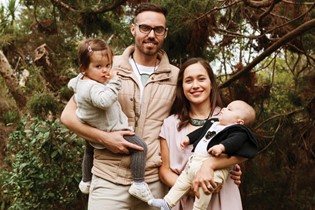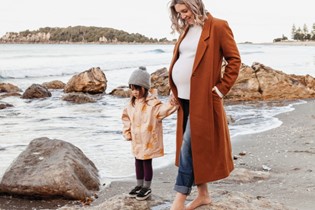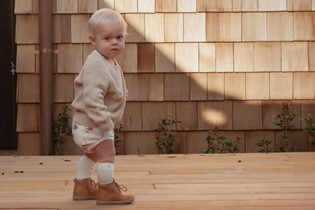Rediscover your vitality after giving birth

Postnatal depletion commonly affects new mums. Nutritionist Ben Warren explains how to nourish your body, restore your hormonal balance and rediscover your vitality after giving birth.
It’s pretty incredible what the female body will do to sustain a brand new life. Via the placenta, a woman’s body provides absolutely everything a baby needs to develop and grow.
However, being the sole provider for this growth and development takes its toll and can seriously deplete you of valuable nutrients. This depletion can affect a multitude of things, from your energy levels and your mood to your hormonal balance, leaving you feeling a bit worse for wear at a time when you need all the energy you can get!

There are a number of ways to give your body a nutritional boost after giving birth, and taking the time to nourish yourself from the inside out really can help make a big difference in your recovery.
FEELING DRAINED
‘Postnatal depletion’ is a term used to describe what happens when your body has used an incredible amount of its own nutrients to grow your baby, and is severely depleted in those nutrients.
It’s a condition that can be compounded by the fact that once baby arrives, the focus of care most often switches from mother to baby, and for some new mums it can feel like keeping up with the demands of a newborn mean her needs go out the window.
While we don’t want to confuse postnatal depletion with postnatal depression, the level of a new mum’s depletion can be a contributing factor to her mental and emotional wellbeing following birth.
GIVE AND TAKE
You could say being pregnant is a little like having a parasite (albeit a lovely one!) living inside you and sucking up all your nutrients in order to grow. When you think of it this way, it’s easy to see how a pregnant woman can become massively depleted. However, despite the vast differences in nutrition and lifestyle of women around the world, most babies turn out perfectly healthy!

Postnatal depletion isn’t always isolated to the months immediately following birth either. A woman can experience postnatal depletion from right after giving birth and on into the first few years of that child’s life.
SIGNS OF POSTNATAL DEPLETION
Hormonal imbalance
One of the most common signs of postnatal depletion that I see is an imbalance in the hormonal systems. Pregnancy not only draws on the mother’s key nutrients, it also demands high levels of female sex hormones (oestrogen and progesterone) to sustain the placenta for the whole duration of pregnancy.
Once your baby is born, these high hormonal levels can drop off rapidly, in particular progesterone. This sudden drop can result in ‘oestrogen dominance’ and cause bloating, breast tenderness and, when it returns, an irregular menstrual cycle.
Oestrogen dominance can be compounded by a high-stress lifestyle and by the environmental toxins to which we’re increasingly being exposed – toxins that can hinder the liver’s ability to clear excess oestrogen.
Feeling low
Mothering is a demanding role that can take its toll both mentally and physically. Having low levels of micronutrients, such as iron, B12 and zinc (which can cause fatigue), combined with the disrupted sleep patterns and rigours of parenting small children can make getting through the days a struggle.
And as mentioned above, in more serious cases this depletion can contribute to low moods and mental health issues. Nutritional deficiencies can lead to an imbalance in the chemicals in our brain, including the levels of serotonin, also known as our ‘happy’ chemical.
The link between nutrient deficiencies and our mental health is an ever-evolving field. A world leading researcher from the University of Canterbury, Dr Julia Rucklidge, has found evidence that diets supplemented with therapeutic doses of micronutrients can support mental health conditions. Dr Rucklidge uses high strength minerals and vitamins in controlled trials for a range of mental disorders from ADHD, to depression and stress, often finding effect sizes comparable to conventional treatments.
WHAT CAN NEW MUMS DO?
Before pregnancy
“An ounce of prevention is worth a pound of a cure”. This old saying is never more true than when it comes to postnatal depletion, and the three to six months before conception offers a great window to really focus on your nutritional health. Some key vitamins to include in your diet during this time are B vitamins, iodine (pregnancy demands a lot of this), magnesium, vitamin D and zinc. It’s also important to get your gut and liver functioning at optimum levels before trying to conceive.
During pregnancy
Two vital nutrients needed during pregnancy are folate and iodine. These two work best together and you can talk to your Lead Maternity Carer (LMC) about taking these as supplements. Also incredibly important are omega-3 fatty acids; your levels of these will decrease as your pregnancy progresses – a result of your body transferring them to your baby. It’s important to remember that nothing works in isolation, so by enhancing your nutrient intake across the board you’ll find each individual nutrient will have a more powerful impact.
After baby is born
As I’ve mentioned, the postnatal period of depletion can be a really long time, and for some women it can be years before they fully recover from growing and feeding their child.

Once baby arrives, my main advice is to be really gentle with yourself and acknowledge the incredible feat you’ve achieved. New parenthood can come with a huge sense of pressure to get everything ‘right’, while still maintaining an immaculate house and trying to get your pre-baby body back. Take each day as it comes, and try not to feel the pressure for everything to be perfect. Below are a few suggestions for helping nourish your body and mind through this time.
✔ Prioritise your sleep The well-known adage of ‘sleep when baby sleeps’ is well-known for a reason! Getting as much sleep as you can will help your body through the repair and recovery process.
✔ Nourish your body Make sure you eat a wide range of nutrient-dense foods. During this time it can be a good idea to steer clear of gluten and refined grains. Both play a role in leaky gut syndrome, and both can often block your absorption of key minerals such as zinc, calcium and iron – so even if you’re getting enough of these minerals through your diet, you may not be absorbing them effectively.
✔ Take probiotic supplements or eat probiotic-rich foods regularly Doing this will ensure your microbiome is full of beneficial bacteria, both for your own health as well as your baby’s.
✔ Reduce liver-loaders Alcohol and caffeine make your liver work extra hard, so to help it clear excess oestrogen and support healthy hormones, cut back on these.
✔ Get plenty of fresh air and sunshine Go outside for at least 10 minutes a day, especially around lunchtime when the sun is highest. Studies show that the body is most efficient at making vitamin D at noon and the fresh air will be invigorating. Vitamin D is a crucial vitamin with several roles: it controls the DNA of your cells, it can aid in weight management through its involvement in the production of insulin, and it can help control the level of calcium in your blood and bones. Vitamin D can also contribute greatly to your mood through its involvement in the production of serotonin.
✔ Get tested If you feel you might be depleted, it can be a good idea to test for any underlying nutrient deficiencies, especially for zinc, iron and vitamin D. You can then work with a practitioner to restore these levels.
|
TOP NUTRIENTS ZINC What to eat: oysters, red meat, lentils, kidney beans, eggs, pumpkin seeds, sunflower seeds, cashews, mushrooms and spinach. Avoid alcohol, tea, and coffee as these compete with, and can inhibit, its absorption.
MAGNESIUM What to eat: dark green veges (such as spinach), pumpkin seeds, dark chocolate, nuts, bananas, almonds, legumes, whole grains, avocados and lean beef and lamb.
VITAMIN D What to eat: naturally fatty foods such as salmon, herring, tuna, mackerel, sardines, oysters, beef liver, egg yolks and mushrooms. Also, getting safe sun exposure between the hours of 11am and 3pm is excellent for soaking up vitamin D.
|
Ben Warren is the founder and clinical director of BePure, and a clinical nutritionist and holistic health expert. He enjoys an organic free-range lifestyle in Hawke’s Bay with his wife and two daughters. Follow his mission at bepure.co.nz.

AS FEATURED IN ISSUE 50 OF OHbaby! MAGAZINE. CHECK OUT OTHER ARTICLES IN THIS ISSUE BELOW

















